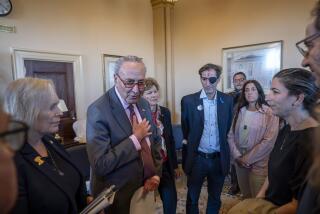Iraq Hostage-Visit Issue Captivates 7th-Graders
- Share via
HUNTINGTON BEACH — Danielle Schroeder’s uncle is stationed in the Persian Gulf, but she wouldn’t go to visit him even if she could because she doesn’t trust Iraqi leader Saddam Hussein.
A friend, Meagan Liss, said she would pack her bags and leave on a moment’s notice to visit a loved one held in Iraq, regardless of the possible consequences. But Jane Chai agrees with Danielle--she would not go to the Middle East, although for a different reason. Jane thinks the U.S. government is making a big mistake in allowing Americans to visit Iraq under any circumstance.
Danielle, Megan and Jane may be just 12 years old, but they and their seventh-grade classmates at Helen Stacey Intermediate School in Huntington Beach have firm opinions about Saddam Hussein and his overture to the West to let friends and relatives visit hostages in Iraq.
It’s a trap, the students concluded. But if Americans must go, they said, they should weigh the risks carefully.
As a writing assignment for their language arts class, the students were asked to respond to a Nov. 19 Times editorial that asked: “Are Hostage Families Right to Go Visit Iraq?”
Danielle doesn’t think so. She believes Hussein has a diabolical plan up his sleeve to strengthen his advantage in the crisis. “Saddam Hussein is trying to get more American citizen hostages,” she wrote. And even if her uncle were a hostage, Danielle said, she would not take Hussein up on his offer.
But Danielle’s friend, Kelly Shaw, 12, argued in her essay that families “should go . . . not for themselves, but for the prisoners. . . . I wouldn’t care if they took me hostage, just as long as I’m with that person who’s captive.”
Jane Chai, who sits next to Kelly in class, said in her letter to The Times that the United States is being careless with the lives of its citizens by not enforcing the federal Logan Act, which prohibits private citizens from interfering in foreign policy. “There are already over 3,776 hostages in Iraq,” Chai, a gifted student like her other classmates, wrote. “How can the government let more of our citizens get sucked into this obvious scam?”
When their teacher, Geri Ogle, assigned the essays, she said she wanted to give them the experience of writing to an audience. However, their responses showed that the crisis means more to them than just mere extra-credit points, she said.
“It’s scary for them because they’re getting to an age where they know this may affect them one day,” Ogle said.
Most of the students, who range in age from 11 to 13, penned their opinions within an hour. But long after their assignment was completed and turned in, the students said they continued to discuss the pros and cons of possible visits to hostages among themselves and with their families.
“If I had relatives there, I don’t think they would want for me to go there,” 12-year-old Allison Pettis said in a classroom interview Tuesday. She added that if she were a hostage, “I probably would be lonely, but I wouldn’t want to endanger (anyone’s life).”
One point to consider, said Matt Bustamante, 12, is that war in the Middle East could be imminent now that the United Nations Security Council has given Hussein an ultimatum to withdraw from Kuwait by Jan. 15 or face military action. Both the hostages and their families would be caught in the cross-fire, Matt pointed out, so perhaps the best possible action is for the families to send presents, pictures or home videos, since they can’t be together for Christmas.
More to Read
Sign up for Essential California
The most important California stories and recommendations in your inbox every morning.
You may occasionally receive promotional content from the Los Angeles Times.













